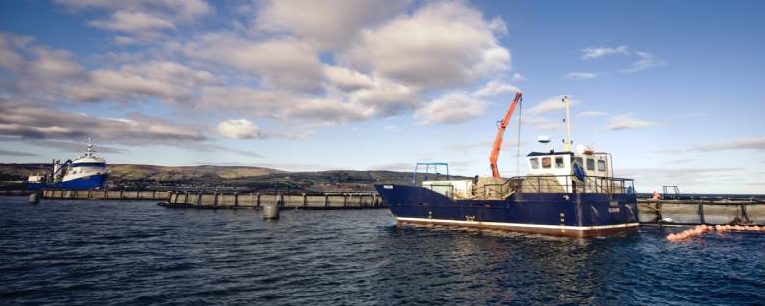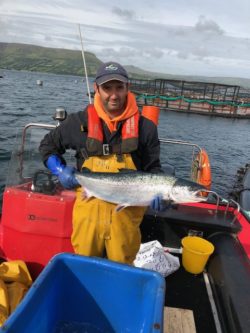What’s the beef with salmon?

With so much attention on soil, organic campaigns and conversations on the future of farming often overlook the otherworldly topic of aquaculture. What’s more, when we do talk about fish, the focus is most often on wild fish and seafood – words such as ‘overfishing’, ‘catch method’ and ‘by-catch’ are justifiably hot topics in debates on sustainable food.
But aquaculture is big business; looking at Scottish salmon farming alone, the industry was forecast to produce more than 207,000 tonnes of fish in 2020, with plans to grow by a further 100-165% from 2018 to 2030. Just like any business, big or small, its impacts need close consideration and are often more complex than they may first appear.
As our best-selling line of fish, salmon was the obvious place to begin looking into the complexities of fish farming. It’s common knowledge that salmon from the UK’s most local waters, the Atlantic, are under serious threat. With wild Atlantic salmon off the menu, this leaves those wanting to eat salmon in a more sustainable way with two options to explore – sustainably-caught pacific salmon, most readily available in the UK in tins (we sell Fish4Ever fully-traceable Alaskan salmon tins) and – you might think – farmed salmon. After all, if taking salmon from their natural habitat is unsustainable, then it figures that rearing salmon in managed systems will reduce pressure on their wild counterparts. Right?
As we were to discover, the inherent problems found in much of the salmon farming industry are a major concern, not just from the point of view of the welfare of the farmed salmon themselves, but also the damage caused to wild salmon and trout through poorly managed farms. From sea bed pollution to unsustainable sources of feed, routine chemical treatment of parasites to high mortality rates, it fast became clear in our research that conventional salmon farming was not something Better Food could continue to back.
If you can excuse the pun, organic farming is at the root of our values. Wherever possible, we’ll seek out organic certified produce and products, recognising that organic certification is the best guarantee that the highest standards of environmental stewardship and animal welfare have been adhered to. But as an ethical retailer, it’s our duty to look beyond the certification and acknowledge that in some cases, extra checks and balances are necessary.
Such is the case with farmed salmon; there are concerns from many environmentalists that even organic farming methods don’t address some of the most serious issues associated with off-shore salmon farms.
For instance, sea lice are a blight on farmed salmon, rife in off-shore salmon farms, stripping the flesh from live fish. High stocking densities create better conditions for the lice to thrive and, as well as concerns for the welfare of the infested farmed salmon, evidence suggests that lice can spread from farms to wild fish populations with devastating effects.
The ‘solutions’ to this problem are problematic in themselves. The environmental impacts of high chemical, vaccine and disinfectant use are a major cause of concern. Meanwhile seemingly harmless ‘cleaner fish’, drafted in to eat lice straight off the salmon, are themselves at risk of being overfished and victim to poor animal welfare.
With this in mind, you may have noticed that in the past year or so, we’ve made some big changes in our fish supply. We no longer sell any fresh (unprocessed) fish from farms, sourcing all our fresh fish instead from hero suppliers Sole of Discretion. They’re making waves (sorry) in the fishing industry by sourcing their fish exclusively from small scale fishers, using low impact methods, and paying their fishers fairly, no matter what they catch. We’ve also committed to reviewing every product on our shelves that contains fish to evaluate the source of the fish, and how it was caught, championing brands leading good practice in the industry, such as Fish4Ever and Wiley’s Finest.

Glenarm Organic Salmon
Smoked salmon continued to be a problem; it’s a favourite with our customers, but it’s not possible to find sufficient supply of wild caught smoked salmon, and we were still concerned about the issues surrounding farmed alternatives.
So, when we heard that Glenarm Organic Salmon, located off-shore of Co. Antrim in Northern Ireland, were doing things differently to even their organic peers, we wanted to see for ourselves what was going on. Our founder, Phil Haughton, dropped in on the farm for a look around.
Glenarm Organic Salmon have never had a case of sea lice infestation – a feat rare enough to be almost unheard of in the salmon farming industry. This is largely due to their location; the fast-moving waters off the Irish coast ensure that any lice passing through the farm are quickly swept through by the current.
The same current brings other benefits that set Glenarm apart. Seabed pollution from fish faeces can accumulate and become highly concentrated in more conventional settings, whilst at Glenarm, waters are refreshed with the tidal flow. It also creates a more natural environment for the salmon, who are continually swimming against its force, building optimum muscle and strength in the process.
Feed on salmon farms is another contentious issue, both in terms of the pollution caused by the feed dropping to the seabed, and concerns over the feed itself: fish-based feeds have been identified as depleting wild fish stocks or using fish that could go directly to human consumption, whilst vegetable-based feeds such as imported soy are often produced in an environmentally-damaging way. Glenarm answered our concerns on all fronts, using only organic, salmon-free pellets made of fish waste from fishing industry and by-catch, and hand-feeding the fish in controlled quantities to ensure that every piece is eaten before it hits the seabed.
Adhering to organic standards still carries considerable assurances and was a major factor in selecting Glenarm Organic Salmon. For example, stocking densities are considerably lower than in conventional farming (10kg/m3 vs 15-20kg/m3) and GM feed is banned.
Any farming, on-land or off-shore, crop or animal, is ultimately a human intervention, and will bring with it complex impacts, both positive and negative. Phil’s visit to Glenarm Organic Salmon showed him an independent farm, striving to produce something to the highest achievable standards, with the welfare of their fish and the stewardship of their environment considered every step of the way. As with all the producers we stock, we’re proud to showcase the best the industry has to offer, learning as we go and sharing the best of organic, local and ethical retail with our customers here in Bristol.
Find our smoked salmon in store or order online through our Good Sixty webshop.
We’ve delisted all farmed fish products from our grocery section, with the exception of organic smoked salmon from Glenarm Organic Salmon which is smoked locally by Severn and Wye Smokery, and some lines of Edgard & Cooper pet food, which contains organic farmed salmon. Some brands of fish supplements contain farmed fish – we are currently looking into the sourcing of each of these products.
